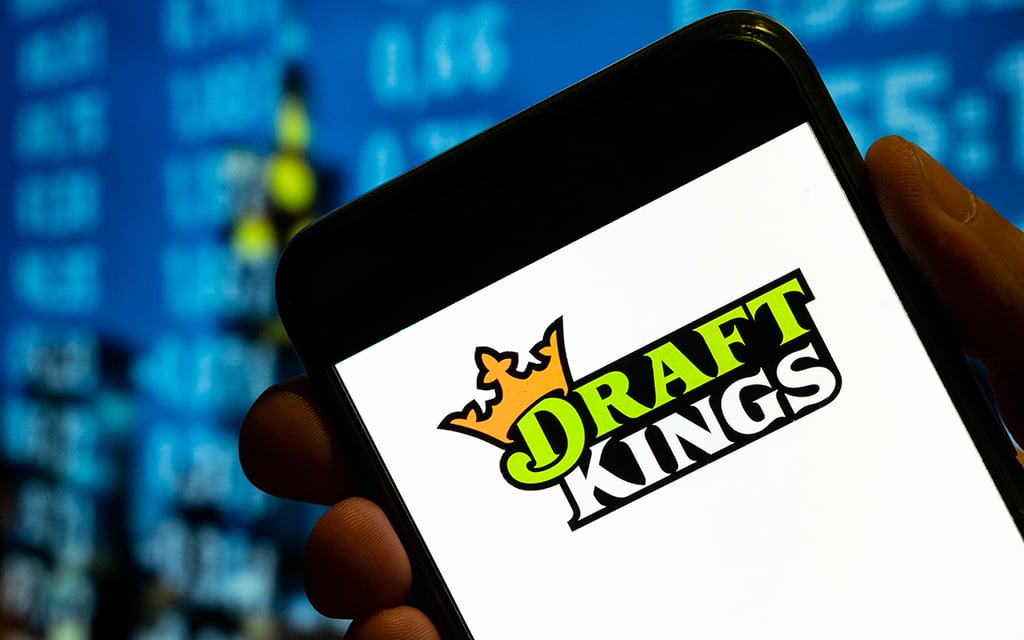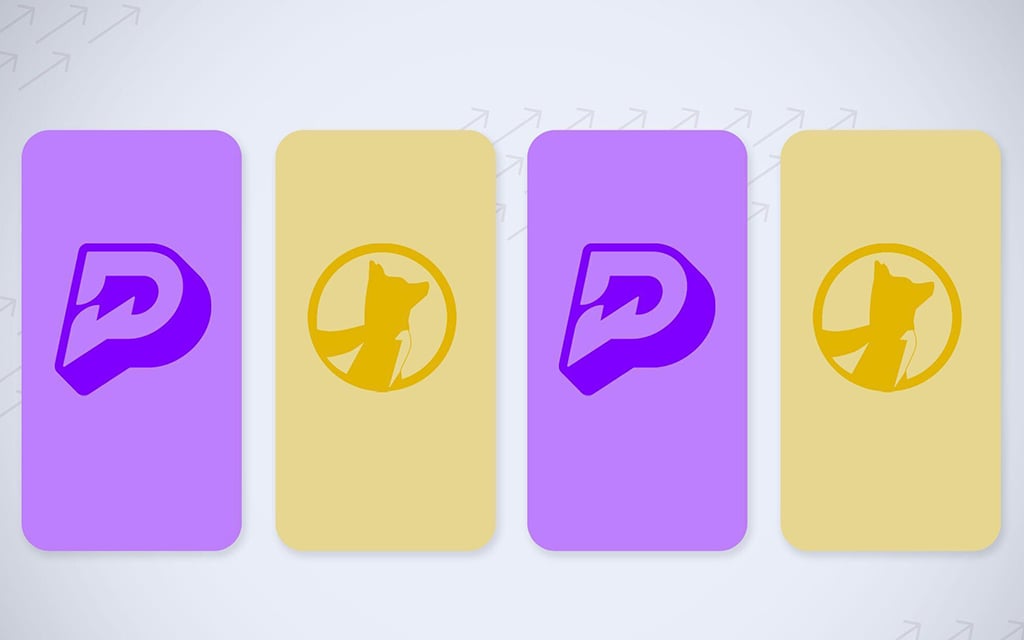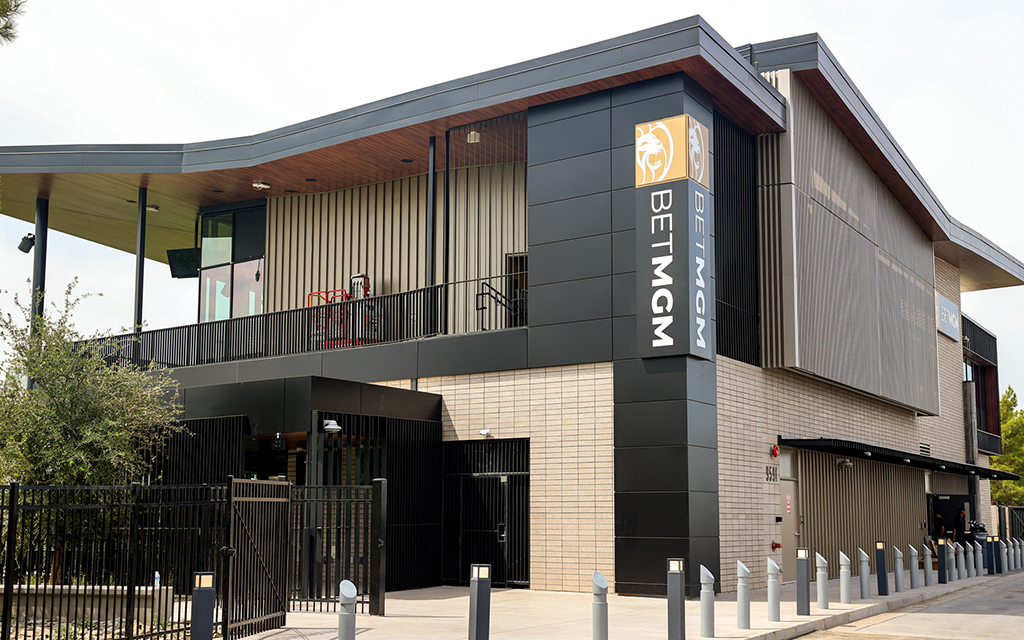
DraftKings continues to shape the gaming landscape with its innovative platform that offers fans a blend of strategy and excitement. (Photo Illustration by Budrul Chukrut/SOPA Images/LightRocket via Getty Images)
PHOENIX – Nick Ercolano, who created the fantasy football “lifestyle brand” BDGE based in Brooklyn, New York, began blogging about fantasy football as an 18-year-old and quickly realized his passion was behind the microphone.
It was a progressive path for Ercolano, whose personal brand started with creating content on YouTube that initially focused on fantasy football but later expanded to other areas such as gambling and lifestyle.
“It wasn’t like I just one day woke up and decided, ‘Hey, I’m quitting my job and I’m going after this thing.’ It was year after year,” Ercolano said. “I had seen the growth be progressive and money started coming in, not at a high level but enough to the point where I felt like I had momentum.”
Progressive indeed. Daily fantasy sports, a subset of the the fantasy sports games that were popularized in the 1980s, is a booming industry thanks to a 2018 U.S. Supreme Court ruling that opened the door to legalized sports betting, an opportunity 38 states and the District of Columbia have embraced.
A January 2023 report suggested the fantasy sports betting market will reach $56.36 billion by 2030.
Daily fantasy sports articles and podcasts are all over the internet. DFS has a head-to-head component where players compete against each other, which originally gained popularity compared to betting against odds. In addition, users can also take part in bigger contests where participants get a share of the prize pool if they place in the top half.
“I believe the DFS and sports betting growth will continue,” said Ben Fawkes, a former vice president of VSIN, an American sports betting radio network and streaming television channel. “I think for daily fantasy sports, since it’s been around a little longer, it’s legal in a lot more states than sports betting, which certainly helps.”
While its growth has brought many great entertainment, it also has brought changes, challenges and concerns. And for some, great opportunity.
Enjoying the ride
Ercolaho created content on the Draft platform before the company changed its name to Underdog because he enjoyed making fantasy football draft content using the website.
“Underdog’s and (my) relationship is extremely organic, probably one of the more organic relationships I feel like I’ve had when it comes to partnerships,” he said.
A clip Ercolano posted on X (formerly known as Twitter) that showed him using the Draft app caught the attention of Draft’s vice president of marketing.
“At the time, they were owned by the same parent company (FanDuel),” Ercolano said. “And I was brought into the office one day, which at the time was cool because that was my first partnership. And I got to go into the FanDuel office.”
Ercolano partnered with Underdog that summer and has been affiliated with the company ever since.
“Most of the time when you’re working with these companies, at least when you’re a little bit of a higher level partner with them, they tend to push you towards exclusivity, where they don’t want you working with other companies in the space,” he said. “It becomes very competitive with them.”
Fawkes, who also grew up in the Brooklyn area, had been around gambling his entire life and took the opportunity to edit gambling content through an internship during his senior year of college.
“Growing up in Brooklyn, you’re just kind of around gambling, in some capacity, just kind of through osmosis,” he said. “And I think it was always something that interested me in college. I was (Economics and Psychology) as a dual major, and I think sports betting is pretty much at the intersection of those two things.”
Fawkes interned at ESPN The Magazine editing gambling content from Chad Millman’s podcast. He parlayed that into a career as a digital content creator promoting ESPN Chalk, which is now ESPN Plus, and helped promote VSIN’s brand by running their website, social media and subscription products creating preview guides for the NFL, NBA and NHL seasons.
“There was very clearly an audience that was gambling, not legally because it was only legal in Nevada at that time,” he said. “But the point was that we knew there was an audience there.
“It was about growing that organically and then eventually getting buy-in from people higher up that they were comfortable producing more of that content.”
Daily Fantasy Sports has become immensely popular in the Southwest since the legislation of sports betting in September 2021. The tectonic moves encapsulate how the betting markets are carving their niche in an untapped industry that caught steam just a decade ago.

As the fantasy sports arena evolves, PrizePicks emerges as a frontrunner with its simplicity, strategic gameplay and unique appeal that distinguishes it in the competitive world of sports betting. (Graphic by Peyton Gallaher/Cronkite News)
Carving out a market
The difference between daily fantasy sports and a classic fantasy football league is how the rosters are constructed. In DFS the contest typically lasts a single day to a week. The roster sizes in DFS allow teams to be constructed week-to-week rather than drafting a team and keeping it for the entire season as one would in a typical fantasy league.
Aside from the cash prizes, some fans enjoy watching sports more when a financial incentive is involved, according to the National Center for Biotechnology Information.
The Fantasy Sports Gaming Association (FSGA) advocates for fantasy sports legislation that adheres to core principles: fantasy sports is a game of skill and should not be legally regarded as gambling. Each contest requires participants to create a new team. Each player has a price, and participants cannot exceed the salary cap of $50,000 for one team.
Sports betting and daily fantasy sports are intertwined because the two biggest sports betting sites, FanDuel and DraftKings, have invested in DFS, which requires participants to build their own lineup to play against other competitors, compared to sports betting, where participants wager for or against particular outcomes.
Daily fantasy sports and sports gambling both have great potential for growth across Arizona, fueled by a surge in marketing campaigns that target online gamblers significantly more. And Arizona’s legalized gambling also attracts bettors from outside its borders.
“You’ll have people from California, driving across the border, or people from Nevada driving across the border,” Fawkes said. “In the same way, we saw that when New York didn’t have mobile betting and New Jersey did, people were going across the GW (George Washington) Bridge or taking the PATH train to New Jersey to place their bets and then coming back.
“So that’s probably more in terms of the growth. The fact that it’s legal in some places and not legal in other places, and knowing that there’s demand for it.”
Due to Arizona’s emergence into a gambling paradise, concerns about ethics and addiction have been brought into sharp focus.
Problems arise
The National Council of Problem Gambling has been tackling daily fantasy sports issues dating back to 2013.
DFS has been a controversial topic for a while, as state legislatures are addressing the issue of its legality and whether or not fantasy games should be considered gambling, which hasn’t been decided across most states.
“If we look at the definition of gambling, it’s to try and win something to gain an advantage, right?” said Mark Lefkowitz, program director for KindBridge Behavioral Health. “And that certainly is gambling. And even Gamblers Anonymous, in the literature, includes fantasy sports as gambling.”
In 2023, the global fantasy sports market was projected to grow at 9% annually through 2027, and North America is projected to be the largest region impacted. This becomes a tough hill to climb for health service companies, but they understand they need to continue to have therapists certificated as gambling specialists and continue to create those networks and provide supervision.
“That’s a lot of money. And it is similar to the gaming industry,” Hatfield said. “Video games have a huge trajectory of an increasing volume of net worth. That’s a lot of players. There’s a lot of gambling, a lot of behavior that, you know, that you could be concerned about in the future.”
One of the biggest issues that has emerged is the age at which gamblers begin participating in fantasy sports and other gaming. Often, it begins with something that can be purchased at any convenience store – scratch-off lottery tickets. There are a variety of such cards, which require only scratching off boxes to win or lose.
“We’ve seen a higher increase for the 18-19 year olds,” said Michelle Hatfield, chief clinical officer at KindBridge. “Interestingly, in my experience of talking with a couple of them, a lot of their beginning gambling behavior starts with scratchers. They start with on their 18th birthday, when they win from those scratchers, then they want to buy more scratchers. And it ends up being a problem.”
“We’ve seen more young guys, right now,” added Lefkowitz, who is working with an inpatient treatment program in Prescott. “And what we’re seeing now is young sports bettors are given a gateway because it’s organized. It’s getting people also to use the medium of the internet.”
There is a high likelihood that fantasy sports players will suffer damage to their emotional or financial health if they become obsessed and cannot stick to time and financial limits, according to experts.
Fantasy sports are defined as games of skill whereas gambling is considered a game of chance. The behavioral outcome, however, can be the same.
“The idea of it being a skill versus a chance, I think that separates the instinct from the behavior itself,” Hatfield said. “So it’s a behavior that people get excited to do and engage in. The behavior itself is what might cause the problem.”
According to the Arizona Department of Gaming’s Fantasy Sports revenue report from September-November of 2022 – the heart of last year’s NFL season – revenues took a substantial leap with PrizePicks. Revenue from its in-state entry fees jumped from $846,843,000 to $1,623,414.00 within a month.
In March, it was found that among selected fantasy sports websites in the United States, PrizePicks.com had the longest average time spent on its website per visit by users, at 14 minutes and 35 seconds.
The simplicity and low cost of licensing have made Underdog and PrizePicks highly prized among sports betting companies who are picking more or less based on player projections and stacking teammates to gain scoring advantages in drafts over competitors.
“In essence, PrizePicks, Sleeper and Underdog have grown a lot because, one, their games are very smart,” Fawkes said. “They’re easy to use, their app, and because they don’t have to pay the same licensing fees as sports betting companies.
“They’re going to have to figure out there’s a couple of states that are now kind of trying to shut them down and put them more into the sports betting category.”
Growth, ramifications of daily fantasy sports
Due to the ease of roster management and the possibility of utilizing different strategies, best-ball fantasy football, which are large tournaments run by Underdog, has gained popularity in recent years. The Pomeranian But SuperFlex is one of 48 NFL fantasy football tournaments that Underdog offers.
In best ball, teams’ starting lineups are determined based on players’ highest scores at the end of the week. A snake draft is used to select players by the contestants.
ESPN Fantasy Football, the most popular fantasy football game in history, surpassed 12 million players for the first time in 2023, according to the ESPN Press Room.
“If there’s one thing we know, it’s that people like to bet on sports and people like to gamble – especially on football,” Fawkes said. “They’ve been doing it for a long time, and they will continue to do it, even though it’s been a rough season for the betting public.”
Sports fans playing fantasy sports (daily or season-long) are more engaged fans. It’s what professional leagues, especially the NFL, want since they were early investors in DraftKings and fantasy sports.
“There’s a lot of research out there that talks about the gaming industry,” Hatfield said. “Gambling industry, internet capability and access. And that rapid response is what is triggering more of the issues around gambling behavior. The anonymity, accessibility and affordability are some of the three factors that do contribute to gambling problems.”
In the years ahead, responsible gaming should become more prominent, and stricter regulations should gain momentum. It’s already evident in mature gambling markets like Australia and England, according to Fawkes, where daily fantasy sports are considered gambling by the laws. Advertising restrictions must be enforced for the fantasy sports market to continue to prosper.


